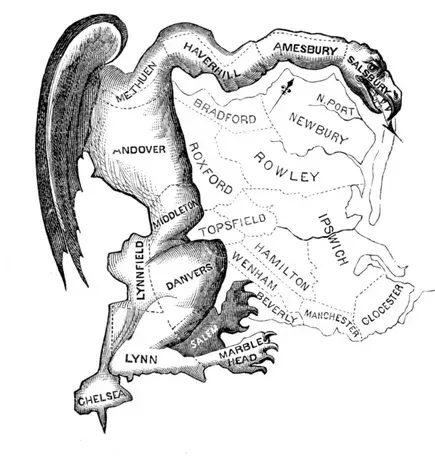Gerrymandering: The Political Art of Picking Your Voters
How Both Parties Rig the Map and Call It “Democracy”

Introduction
Every few years, a familiar political story reemerges: outrage over “gerrymandering.” The media runs maps showing bizarrely shaped districts, pundits cry foul, and lawsuits fly. If you listen to the coverage, you might think gerrymandering is a trick unique to one party — usually Republicans.
But here’s the truth: gerrymandering is a bipartisan blood sport, perfected over decades by both Democrats and Republicans, each manipulating district lines to maximize power and minimize competition. And as long as political insiders are drawing the maps, the voters aren’t really choosing their representatives — the representatives are choosing their voters.
What Gerrymandering Is (and Isn’t)
Gerrymandering is the deliberate redrawing of electoral districts to favor one party, dilute the voting power of certain groups, or protect incumbents. The name comes from an 1812 Massachusetts district signed into law by Governor Elbridge Gerry that looked like a salamander — thus “Gerry-mander.”
There are two primary tactics:
- Packing – Concentrating the opposing party’s voters into a few districts so they win those overwhelmingly, but lose influence elsewhere.
- Cracking – Splitting the opposing party’s voters across multiple districts so they can’t form a majority in any one of them.
Both methods warp representation and can make election results wildly out of step with the actual political makeup of a state.
Who’s Guilty? Everyone.
If you think only Republicans gerrymander, you haven’t been paying attention.
- Republicans have engineered some of the most infamous maps in North Carolina, Texas, and Wisconsin, often locking in legislative majorities with fewer overall votes.
- Democrats are just as ruthless when they control the process, as seen in Illinois, Maryland, and New York, where maps have been drawn to cement Democratic dominance and squeeze out GOP influence.
The hypocrisy is breathtaking: the party in power defends its maps as “fair representation,” while attacking the other side’s maps as “voter suppression.”
Why Gerrymandering Thrives
- State Control of Redistricting
In most states, the legislature draws the maps. That means the ruling party sets the boundaries — and magically, the maps almost always favor them. - Weak Legal Standards
The Supreme Court has ruled that partisan gerrymandering is “nonjusticiable” in federal court (Rucho v. Common Cause, 2019), meaning it’s up to states to fix — and most won’t. - Technology
Modern mapping software lets politicians gerrymander with surgical precision, using voter registration, turnout data, and even consumer behavior to predict how neighborhoods will vote.
The Consequences
- Fewer Competitive Elections – Gerrymandered districts often produce “safe seats,” where the only real contest is the primary. That pushes candidates toward the extremes, making compromise rarer.
- Voter Disillusionment – When maps are rigged, people feel their votes don’t matter — and sometimes they’re right.
- Entrenched Incumbents – Politicians in gerrymandered districts can hold onto power for decades, insulated from real accountability.
The Media’s Skewed Narrative
When Democrats control a state and gerrymander, the coverage is often muted or described as “correcting” past imbalances. When Republicans do it, it’s “undermining democracy” or “voter suppression.” The reality is that both parties undermine fair representation when it benefits them, and the selective outrage only serves to protect whichever side currently holds the pen.
Is There a Solution?
Some states, like Arizona, Michigan, and California, have adopted independent redistricting commissions to take map-drawing out of the hands of politicians. The results have been mixed — but generally, they’ve led to more competitive districts and less blatant manipulation.
Ultimately, though, the only real solution is political courage — and that’s in short supply. As long as gerrymandering is legal, the party in power will use it.
Why This Matters
If we want representative democracy to mean anything, the voters should choose their representatives — not the other way around. Gerrymandering robs citizens of meaningful choice, inflames partisanship, and erodes trust in the system. Both sides love it when they benefit from it, and both sides cry foul when they don’t.
Until voters demand fair maps regardless of party, the game will go on. And politicians — from both red and blue states — will keep picking their voters instead of earning them.
Disclaimer:
The views expressed in this post are opinions of the author for educational and commentary purposes only. They are not statements of fact about any individual or organization, and should not be construed as legal, medical, or financial advice. References to public figures and institutions are based on publicly available sources cited in the article. Any resemblance beyond these references is coincidental.
References
- Rucho v. Common Cause, 588 U.S. ___ (2019)
- Levitt, J. (2019). A Citizen’s Guide to Redistricting. Brennan Center for Justice.
- Wang, S. S. (2016). Three Tests for Practical Evaluation of Partisan Gerrymandering. Stanford Law Review, 68(6).











